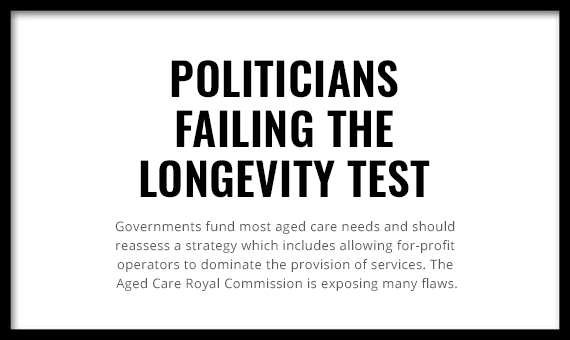Increasing lifespans are a consequence of our
social development over the past 200 years.
We can and should take more advantage of
the opportunities of this as well as managing
the problems better. How?
Having properly informed politicians
One third of voters are now between 55 and
75 and their proportion of the population is
surging. Their voices are being heard more
than ever and this will increase.
Good responses to the resulting social changes
are available but have been regularly pushed
beyond the short-term political horizon.
The political risk of this inaction is rising fast,
as Finland found when inadequate and poor-quality
aged care recently led to the overturn of the long-term
governing party.
The misconception that people simply ‘get old’
has underpinned many political responses.
However, we become more different from
each other with age, not more alike. Close
personal support is required. Institutions have
major difficulties in dealing with this, and so
are prone to poor responses for aged care.
Governments fund most aged care needs and should
reassess a strategy which includes allowing
for-profit operators to dominate the provision
of services. The Aged Care Royal Commission is
exposing many flaws.
Being ethical
It is ‘ethical’ to prolong life for almost any
reason, yet the consequences are rarely taken
into account. In many cases people are
exposed to the risk of a remaining life which
can range from miserable to atrocious, often
without them realizing this. People should
push to be better informed and be able to
choose the most appropriate end of life
action for them, with support as necessary.
Being personally accountable
Aged care is required to attend to:
- Functional dependency – unable to manage normal activities of living
- Poor physical health
- Cognitive impairment
- Poor mental health such as depression
If we each address these earlier, our need
for aged care support can often be delayed
and our ongoing quality of life improved,
often at lower cost.
Having access to good advice
Social support is a major positive factor in
effective ageing. It’s not just a matter of
professional advice. As a community we
should better inform people about why
longevity is increasing and what they can
do to make a difference for themselves.
Poor financial literacy is a major obstacle
for older people although professional
advice is available. However, access to
professional longevity advice remains very
limited. Resolving this has been our
challenge at My Longevity.
We all talk easily in ‘time’. By realizing our
own time frame and its possible stages and
influences as we age, we are more likely to
make the best of the rest of our life.
Everyone benefits from a more informed
and engaged older community, especially
because it continues to grow.
This is why we developed the Longevity
Plan – to enable each person to understand
and prepare for their own journey while
they are in reasonable shape.
